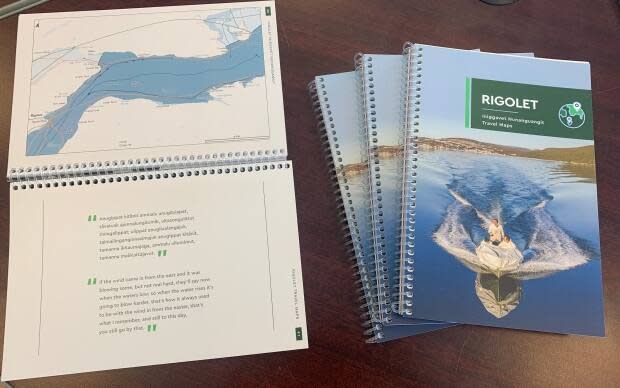Research booklet created with Inuit knowledge maps ice routes changing with the climate


A team of researchers at Dalhousie University are bringing their work on Labrador's ocean currents, sea ice and travel routes in Nunatsiavut back to the people who helped push it forward.
The work began in 2019, when researchers Breanna Bishop, May Wang, Katrina Anthony and project lead Eric Oliver travelled to different communities to help their understanding of environmental change. Data collection was fuelled by elders, knowledge keepers and community members who were invited to draw travel routes they used to be able to take to show how climate has changed them over the years.
"Based on all of this and a lot of feedback from people who participated, they wanted to see how it would come back to communities so that we could share the maps as well as kind of the safety advice that people were sharing with us as well," Bishop, a PhD student at Dalhousie, said Friday.
Now Bishop and the team are back in Labrador, handing out the data and maps in the form of paper booklets. The small booklets, printed on water-resistant paper, are designed to be taken on the land where anyone can fill in their own routes.
Each community the group visited has their own booklet. Bishop said it was important for researchers to share the work with the communities involved.
"It's important to have somewhere to look to to reference, especially for the younger generation," Bishop said. "We wanted to make sure that it was brought back and shared with the community, and not just ourselves as researchers."

Bishop said she and the team were most surprised by the steps communities are taking to combat climate change, adding she was impressed by the level of resilience and adaptability in the region.
"There's not just one travel route that might get sacrificed if the ice changes; there's many travel routes that could be used to kind of help adapt to these changing conditions," she said.
"That was something that I feel like often gets left out of the climate change narrative when we talk about what communities are experiencing, is the power of adaptability and how expert so many Inuit are at adapting to these changes."

Bishop said she hopes to bring more traditional Inuit knowledge to the academic table, after seeing the value it bring to projects like theirs.
She also hopes continuing to work with people in the communities the team visits can chart the course for her future research.
"On this trip it's a little bit of getting an understanding of what is concerning and of interest, and how I can shape the next couple years of my PhD research to hopefully meet some of the questions."
Booklets are available at the Inuit community government office in Rigolet, and Bishop is continuing her trip up the northern coast of Labrador this week.


